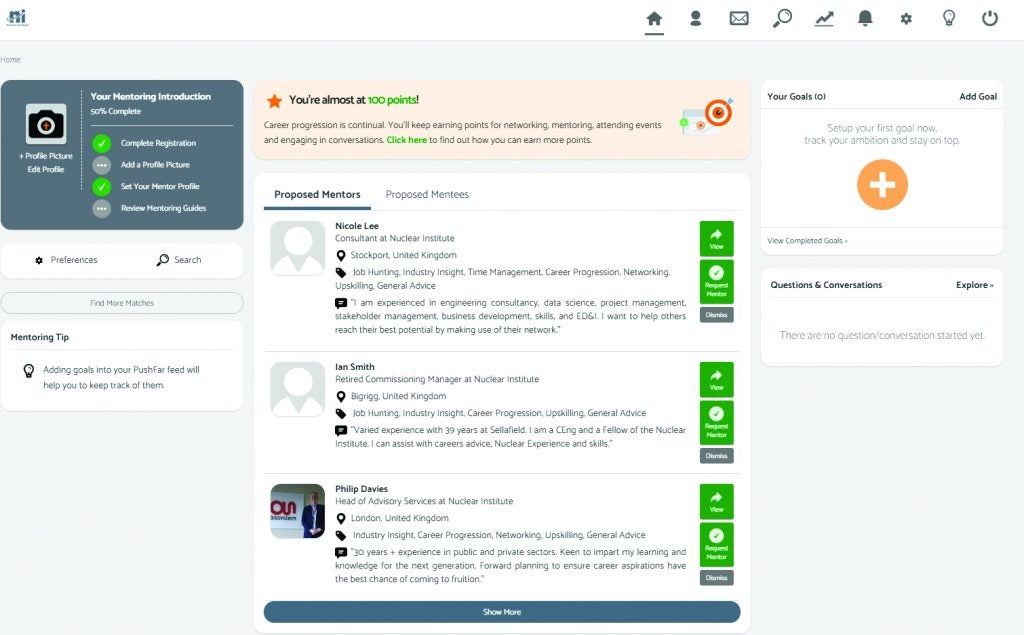
Most people are familiar with the Pareto principle; the strange phenomenon whereby disproportionately small or simple interventions (20%) often generate the majority of meaningful impact (80%). Consider exercise; now, imagine if there was a drug that could reduce your risk of all chronic diseases, increase your energy levels, reduce stress and anxiety, make you more competent and creative, all while making you more attractive? People would be queuing up for this miracle drug! It’s strange to contemplate that you can get the same results from just moving around a bit.
We’ve been reflecting on this now that the Nuclear Institute (NI) has launched our Nuclear Mentors scheme, as mentoring is in many ways, similarly “magic”. On the surface, it’s rather simple, and believe it or not, something almost anyone can do. However, the impact on individuals, companies and entire industries of the connections made through mentoring is surprisingly disproportionate.
Mentors are currently offering to support with areas ranging from “understanding my early career options” to “transitioning into senior leadership roles” to “moving into a different sector of nuclear”. And all manner of technical and non-technical skills in between, from engineering to people management, from business improvements to political and climate activism. And much more in between!
What is mentoring?
Simply put, a mentoring relationship is a supportive and developmental partnership between a more experienced individual (the mentor) and a less experienced individual (the mentee). It’s a two-way street where both parties can learn and grow. Some key aspects include role modelling, psychosocial support and encouragement, a structure for self-reflection, support for goal setting and an outside perspective that can help the mentee at moments when they might not be able to “see the wood for the trees”. Knowledge or hard skills transfer is often part of it, but it’s not (as is often assumed) the primary aspect of a mentoring relationship.
It is typically rather about empowering the mentee to ask the right questions and take ownership of their learning journey; all while benefitting from an empathetic sounding board and supportive presence.
There is also “reverse mentoring”. This is when a senior person connects with a more junior person to learn from them. This could be for something specific like a skill or technology. It can be used to help management understand the challenges and perspective of “boots on the ground” in order to make better decisions. Companies have also successfully used reverse mentoring successfully in order to drive better-informed equality, diversity and inclusion (EDI) strategies by connecting decision-makers with junior staff from less well-represented groups.
The benefits of mentoring?
Study after study has shown the positive impact of mentoring. At first glance, one might assume this only applies to the mentee. And while yes, it definitely does (mentees are more likely to feel valued, stay in their jobs, get promoted, receive salary increases and become mentors themselves), remarkably, it seems equally beneficial for the mentor and the organisations they sit within.
For example, one recent study found that mentors were promoted a huge six times more often than their non-mentor colleagues? Not surprising when you consider how many mentors report that they gained as much, if not more, out of the relationship than their mentee.
This included improved communication & leadership skills and an improved sense of self-worth. Several of the mentors in our pilot scheme reported another unexpected side effect; the relationship forced them to naturally reflect on their own successes, and as a result, they received a big boost to their confidence and self-worth when they realised how much they’d achieved in the course of their careers.
Similarly, the benefits to organisations are clear. Another study found that companies that made mentoring available had significantly better staff satisfaction and retention rates among mentors (69%) and mentees (72%).
Hardly surprising when you consider 94% of staff (according to LinkedIn) say that how long they’ll stay with an employer hinges on opportunities for structured learning and growth.
When you consider the huge cost of hiring and training new staff, as well as the “brain-drain” impact of employees leaving (taking their accumulated skills and knowledge to competitors), the benefits to companies cannot be underestimated.
Mentoring has also been shown to support EDI goals. Another study found that a company’s in-house mentoring scheme boosted attraction and retention of under-represented groups by up to approximately 25%. The same study (by Cornell University) found that having access to mentorship improved promotion and retention rates for those from ethnic minority backgrounds and women.

The NI has offered mentoring on an invitation-only basis for a number of years. Now we’ve partnered with one of the world’s premier digital mentoring platforms so that we can scale this up, in both numbers and scope (i.e. across all possible career competencies). The platform allows members to sign up to be a mentor or mentee (or both) and create a profile based on the qualities or skills you seek support with or are offering. Once a match is made, the pair can arrange a first virtual meeting to discuss what they’re hoping to gain and set goals. The frequency and length of meetings can be flexible, but as a rule of thumb, we recommend most will be an hour a month for six months. Most mentors are taking on one mentee at a time. We have had some super keen types with up to four – we won’t say no, of course, but one mentee seems to be manageable for most people.
Over 200 members have already signed up as mentors and mentees, often both, across over 70 companies and educational institutions. The scheme has only been open for three months, and we anticipate significant growth as we continue to promote the scheme to over 5,000
members.
Who can be a mentor?
In short, anyone! Everyone has some experiences and perspectives that could be useful to someone lower down the ladder. Or in the case of reverse mentoring, up the ladder.
Many universities even have highly successful peer-mentoring or “buddy” schemes, where third year undergrads are paired with first years to help support their transition to university. At the NI, we’re planning a lot of educational outreach, and are currently trying to encourage young professionals to consider mentoring a student. The student gets an insight into what it’s like to join the industry, and young professionals build the communication and support skills that will ultimately make them tomorrow’s future leaders.
At the other end of the scale, a number of retirees who have held senior roles in industry have been successfully mentoring mid-career professionals in the ”soft skills” required to take on a senior role or promotion. One of our mentors is so experienced they’ve advised five successive secretaries of state on the future of the industry.
And it can include everyone in between; from those who want to become Chartered, move to a different sector within nuclear, weigh up their options in terms of career path, or get advice on specific topics like safety case analysis or improving a company’s EDI policies.
Everyone has doubtless had times when a key decision was impacted by one of those “you don’t know what you don’t know” moments – times that could have been avoided with a bit of guidance. And everyone has almost certainly had points in life where they could have used a bit of support and a different perspective.
The qualities that make a good mentor include empathy, patience, active listening, effective communication, a positive attitude and a willingness to share. As well as the ability to creatively problem-solve, set goals and determine priorities.
We believe these are qualities that exist in abundance in the nuclear sector due to the nature of it being a highly skilled and demanding profession that requires the very best. Therefore, we have high hopes for the growth of Nuclear Mentors.
Why is mentoring so important to nuclear right now?
The nuclear industry is entering a new period of rejuvenation and challenging targets as the government realises the importance of safe, clean power to meet net-zero goals. It’s never been more important to attract and retain the best talent to the sector. We believe widespread access to mentoring can make a huge difference in supporting the nuclear workforce.
To find out more, please visit https://nuclearinst.com/membership






